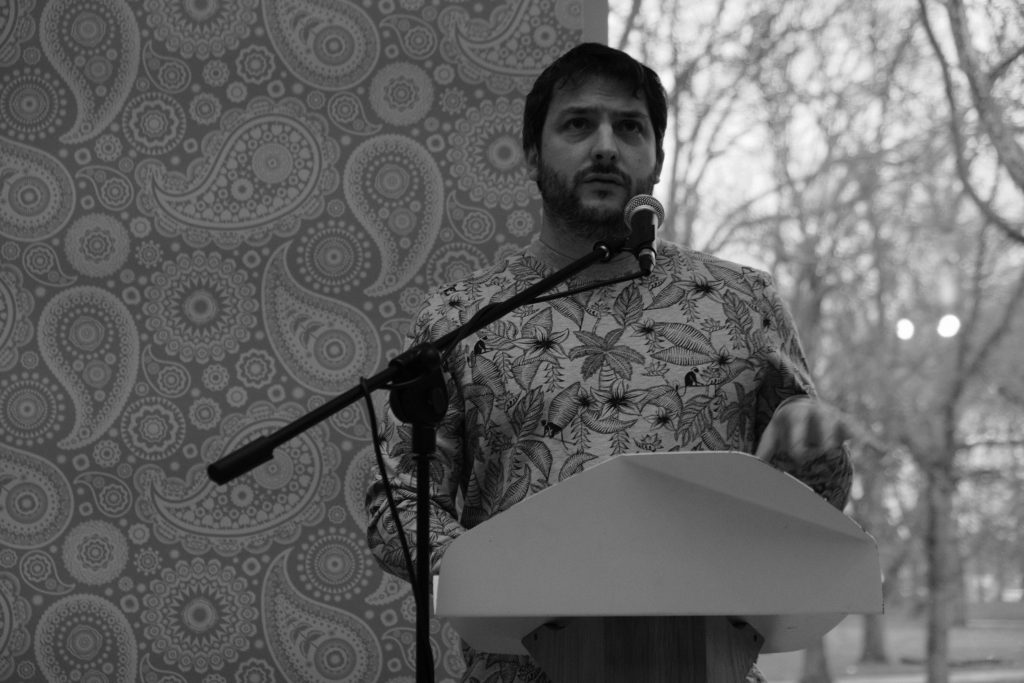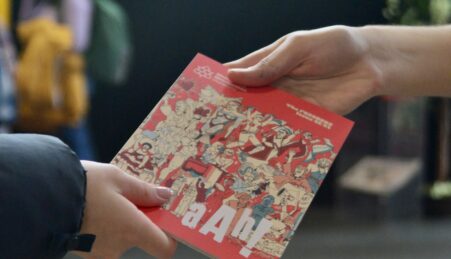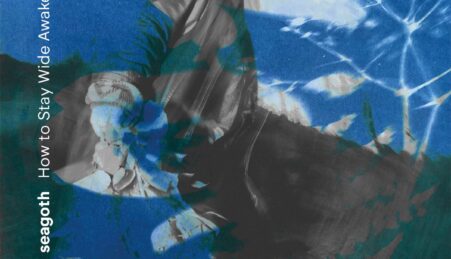aAh! caught up with poet, editor, and translator Martin Kratz on how he has stayed creative during the ongoing pandemic and second nationwide lockdown.
Martin Kratz is the Projects Manager at Manchester Metropolitan University and is involved in the upcoming opening of the Manchester Poetry Library.
Martin worked on the bid to name Manchester a UNESCO City of Literature, has multiple publications including Mount London, Penned in the Margins (2014), which he worked on as an editor, and his own poetry is published in the pamphlet A Skeleton’s Progress (Poetry Salzburg 2018). He also has a selection of translations published in The Heart of a Stranger: An Anthology of Exile Literature (Pushkin press, 2019).
Hi Martin, start us off by telling us a bit about your background?
“I was born here but my parents are German, so I grew up bilingually. I’m really interested in poetry as a space in which languages can sit happily alongside each other. Society expects us to separate languages into different compartments. That is reflected in my writing, but also my work at the poetry library because one of the big focuses is poetry in different languages. 200 languages are spoken in Manchester. One of our ambitions is to get all of those languages represented in the library. I’ve published poetry and translations. At the moment I am working on reviews of translations and translating poetry as well.”
What have you been working on while under lockdown restrictions?
“I have not written anything about the lockdown and I probably won’t for about five years. Normally when I am writing I think ‘Oh where did that come from?’ I have to think pretty far back. The one thing I did notice was that I started translating a lot. With translation I don’t have to ask myself: what am I going to write about? It doesn’t take that particular energy. The text is just there and waiting for me when I am ready to write. So that’s been really exciting.
Are you finding it more challenging to stay motivated during the lockdown?
“Lockdown has been a weird phase, but in some ways, it’s been really productive for me. In my day job, lockdown and Covid have of course been very disruptive, but I am very lucky that I have been able to continue work.”
“On the creative side of work, I’ve tried to focus on things I can finish and complete. For me, the lockdown (because it affects our sense of time) has been marked in particular by a strong feeling of drift, a feeling that you’re not doing anything.”
“Because creative labour doesn’t always look like work in an obvious sense, even to yourself, that feeling is often there when you’re a writer anyway. This current situation has amplified that. Time and geography, home and work are crammed together, there are no lines there, so maybe that’s what it is. Finishing projects is a way of anchoring yourself in something when the whole world has been ‘dis-anchored’ around you.”
How has this experience changed your creative process?
“It’s really different. Before lockdown, I had a two-hour commute either way from work. That two-hour commute was my writing time. The train journey was really important. I got a lot of reading and writing done. Suddenly everything has shifted into the evening which is really different. Also, I write differently. If you’re writing at the end of the day you’re exhausted, so you need to write with the energy that you’ve got. Any creative writing that comes from lockdown, for me, is just a mass of notes, and I think it will probably stay that way until I have time to look back at it.”
“I wonder if that’s going to happen to a lot of people. A lot of my poems I can just throw out, a lot of them won’t be poems, a lot of them will just be me working through the situation.”
Have you been reading or listening to anything to help you stay inspired during a lockdown?
“For a long time I didn’t feel like writing during lockdown, but I did read and that’s part of writing. They don’t go without each other. I’ve been reading a lot of stuff in translation. I keep a reading journal which helps me keep track of what I have read. I think monitoring what you have been doing is important. Rather than just reading one book by one poet, I’ve been trying to read as much of their work as possible, and that’s been a really interesting project. Just to read everything that someone has written, to see how they grow.
“It’s good to read the stuff they’ve written when they’re not writing very well, that’s kind of encouraging. Watching writers grow over time. Maybe that has something to do with the way this situation has played with our sense of time. It feels both sped up and slowed down, and this is why I keep coming back to this desire to complete a project, any project at all. If time isn’t functioning as it should, we have to make our own creative waymarkers.”
Do you feel hopeful about the kinds of work that will come out of this situation?
“Yeah, sure. I think there already is a lot of helpful work coming out of it. The Write Where We Are NOW project that Carol Ann Duffy did with the Manchester Writing School, there was some really interesting work there. I think everyone’s response has actually been quite different, and I wonder what people are finding, or reaching back to in this moment. What they are drawing on. It’s probably derailed everyone. What many people thought they would be writing now, I bet they’re not. If that’s the case… what are they writing about?”
What advice would you give for people wanting to be creative in lockdown?
“Reach out to others. That’s the most important thing. Join a group, do an activity reach out to friends, make sure you keep sharing stuff and it’ll come. I don’t know why, but when you talk, at least when I talk to other people, it reminds me why writing happens. You don’t necessarily need to join a writing group, it could be reading, and things like that. The other thing is to be open to doing things differently. You have to be.”
Does the Manchester Poetry Library have any upcoming events or workshops we should know about?
“Things have quieted down a bit and will do until the holidays are over. When we open in the new year, we will start with our new 2021 programme. Keep an eye on things. We may well have a translation workshop that will be open to anyone. That will be with the Poetry Translation Centre and anyone can participate no matter what the language is. There’s always a language expert and a poet and you work as a group to translate the work together. It’s really fun, and it’s a great way to learn about another language and culture. That’s definitely coming up.
“The best way to find out about what’s going on is to keep an eye out on our social media channels or sign up for our newsletter. There is always going to be stuff going on.
“If there is something people want to do, just to get in touch with us. We are lucky enough that we can be responsive with making new programs. We can probably do something if enough people are interested. If people feel there is something that is missing, go ahead and write to me directly.”
To stay informed about new events and workshops hosted by the Manchester Poetry Library, you can follow them on Twitter and Instagram, and check out their website where you can sign up for the Manchester Poetry Library newsletter.
Keep an eye out for our next Creativity in Lockdown interview which will run in December, and feature an exclusive interview with Manchester Met lecturer, poet, and short story author Adam O’Riordan.






Leave a reply